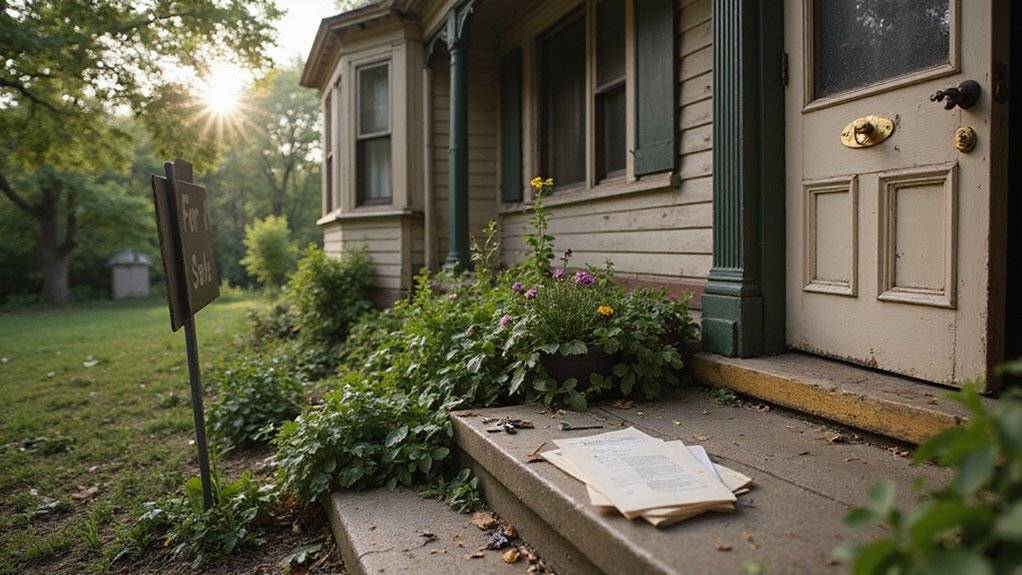Dealing with property sales during probate creates endless headaches for grieving families nationwide. The complex legal requirements and waiting periods add stress during an already difficult time. Fortunately, several pathways exist to sell inherited property, even during the probate process.
While you cannot sell a house before probate concludes without court approval, certain exceptions apply. Properties with transfer-on-death deeds, joint tenancy arrangements, or living trust designations can bypass probate requirements. Small estates under $40,000 in Missouri may qualify for simplified procedures.
In this guide, we explore the complete process of selling houses during and after probate proceedings.
Key Takeaways
Selling estate property before obtaining court approval and Letters Testamentary is prohibited and can result in legal complications.
Transfer-on-death deeds, joint tenancy, and living trusts allow property transfers without probate court involvement.
Small estates under $40,000 in Missouri can use simplified affidavit processes to transfer property without formal probate.
During probate, executors can sell property after filing petitions and receiving court approval at key transaction stages.
Court-approved appraisals and sale confirmations are required, with heirs and creditors having 30 days to contest transactions.
What Is Probate and How Does It Impact Home Sales?

Probate is a legal process that transfers property ownership after someone dies. The court must verify the will and settle debts before any real estate sale can occur. A personal representative needs official court approval to sell the property.
This process typically takes six months to a year in Missouri courts. The court protects all beneficiaries by reviewing property values and sale terms. Meanwhile, heirs cannot sell or transfer the property without proper authorization.
As a result of these requirements, home sales through probate require extra patience and legal compliance. The court’s oversight ensures fair treatment for all parties involved in the property transfer.
Can You Legally Sell a House Before Probate?
You generally can’t sell a house before probate unless specific legal exceptions apply. Missouri law requires court authorization through probate, but properties held in joint tenancy, living trusts, or with transfer-on-death deeds can bypass this process entirely. The rules vary significantly by state, so understanding your jurisdiction’s requirements is essential before attempting any sale.
Legal Restrictions on Pre-Probate Sales
Pre-probate home sales face strict legal restrictions in Missouri. The law prohibits selling estate property before probate court approval. Missouri Revised Statutes Chapter 473 requires executors to obtain Letters Testamentary first. Valid property transfers need proper court authorization. This process protects all parties involved.
Pre-probate sales can result in title defects, beneficiary lawsuits, and criminal penalties. A proper legal sequence ensures smooth transactions. The executor must open probate and receive court permission before listing any property. Moreover, this approach safeguards buyers and heirs from future complications.
Exceptions That Allow Pre-Probate Sales
Legal exceptions allow property sales before probate in specific situations. Transfer on death deeds enable named beneficiaries to sell property immediately after the owner’s death. Joint tenancy with survivorship rights automatically transfer full ownership to surviving co-owners.
Missouri law permits small estates under $40,000 to use simplified transfers through Section 473.097. However, this option rarely applies to real estate due to higher property values. Moreover, living trusts offer another practical solution for property transfers. Trust documents let trustees sell assets according to pre-established terms without court approval.
State-by-State Variations in Probate Laws
Probate laws vary significantly between U.S. states, creating different rules for handling inherited property. California permits simplified processes for estates valued under $184,500. Texas allows independent administration for quicker property transactions through probate. Florida mandates formal property appraisals before any sales can proceed.
Moreover, state timelines differ considerably. Some jurisdictions complete probate in weeks through affidavit processes, while others require years of legal proceedings. Local expertise becomes essential for proper compliance.
Local probate attorneys understand these complex variations and help ensure lawful property transfers. Their guidance prevents costly mistakes during estate settlements.
What Are Your Options for Selling a House Before Probate?
If you’re looking to sell a house before probate in Missouri, you’ll need to investigate legal alternatives that bypass the traditional probate process. Your main options include small estate affidavits for estates under $40,000, transfer-on-death deeds that designate beneficiaries, joint ownership arrangements with survivorship rights, and living trusts that transfer property directly to named trustees. Each method has specific requirements and limitations, so you’ll need to determine which option applies to your situation.
Small Estate Affidavits
Small estate affidavits allow heirs to transfer assets without formal probate in Missouri. The total estate value must stay under $40,000 to qualify for this simplified process. Heirs must wait 30 days after death before submitting the affidavit.
The process saves time and money for qualifying estates. Section 473.097 of Missouri law governs these affidavits. Recipients can present the document directly to banks and institutions holding assets.
However, estates with real estate exceeding the limit cannot use this option. In such cases, standard probate becomes necessary.
Transfer-on-Death Deeds
Transfer-on-death deeds provide a legal way to pass property directly to beneficiaries without probate. These deeds require proper filing with the county recorder while the owner is alive. The property transfers automatically when the owner dies.
Owners maintain full control of the property during their lifetime and can revoke the deed anytime. Beneficiaries gain immediate ownership rights after death. As a result, they can sell or transfer the property without court approval.
Most importantly, this tool saves families time and money. The process skips lengthy probate proceedings and reduces legal expenses for property transfers.
Joint Ownership with Survivorship Rights
Joint ownership with survivorship rights enables all owners to inherit a property automatically when one owner dies.
The law transfers full ownership to surviving owners without probate court involvement. A death certificate serves as the main document to update property records. This simple process saves both time and money.
The benefits prove significant for co-owners. Property access remains uninterrupted after death. Legal costs stay minimal without court proceedings. Title transfers happen quickly with basic paperwork.
Above all, this ownership structure requires trust and cooperation. All owners must share equal rights and responsibilities in property decisions.
Living Trusts
A living trust legally transfers property ownership while letting you maintain control during your lifetime.
The trust requires naming a trustee to manage assets and a successor trustee who takes over after death. This arrangement allows property sales without court approval. Your heirs can access and distribute assets immediately.
Moreover, the trust helps families avoid lengthy probate processes and expensive court fees. The trust document must clearly specify asset distribution plans and beneficiary details. A properly structured trust provides peace of mind through simplified estate management.
How to Sell a House During the Probate Process?

If you’re selling a house during probate in Missouri, you’ll need to follow specific court-mandated steps to ensure a legal transaction. The process requires filing formal petitions, obtaining judicial approval at key stages, and meeting property valuation standards before any sale can close. Understanding each requirement—from initial filing through final confirmation—will help you navigate the probate sale efficiently and avoid costly delays or legal complications.
Initial Petition Filing
To sell a house during Missouri probate, start by filing a petition at your county’s probate court. The law requires you to submit a death certificate, original will, heir information, and property inventory to open the estate. A complete petition safeguards you from liability issues during the sale process.
The court reviews your petition and grants letters of administration when approved. These official documents give you legal authority to proceed with the property sale. This essential step protects all parties involved and ensures a proper transfer of ownership.
Securing Court Approval
Court approval requires five essential documents to authorize an estate property sale. A licensed appraiser must provide a property appraisal to establish current market value. Real estate agents submit the purchase agreement to prove buyer commitment. Probate attorneys handle two critical filings: notices to heirs and the formal sale petition.
A complete title report from a title company verifies clean ownership. The court reviews these documents to confirm the sale benefits all beneficiaries and meets legal requirements. Your probate attorney guides this documentation process to protect everyone’s interests.
A successful approval depends on accurate, thorough preparation of these materials. As a result, most courts approve properly documented sales within 30-45 days.
Property Valuation Requirements
Courts require a certified property appraisal completed by a licensed professional appraiser. A proper valuation safeguards heir interests and ensures fair market deals.
The appraisal must include a current market analysis with recent comparable sales data. A comprehensive report should detail property condition, needed repairs, and existing upgrades. The appraiser’s state license and credentials must meet specific court standards.
Simple online estimates or informal valuations will not satisfy legal requirements. Courts accept only thorough, independent appraisals that justify the proposed sale price.
Marketing and Receiving Offers
A court-approved appraisal must be in place before you can list the property. The right real estate agent will handle all marketing duties for your probate sale. These professionals know exactly how to navigate probate requirements and timelines.
Your agent lists the property and manages potential buyer viewings on your behalf. All offers must go through probate court approval to protect the estate’s interests. A judge reviews each offer for fairness.
During court confirmation hearings, other buyers can submit higher bids to increase the final sale price. This competitive process helps maximize returns for beneficiaries. As a result, everyone involved benefits from the best possible outcome.
Final Sale Confirmation
A final sale confirmation verifies property transactions through court approval and heir notifications. Courts must review all sale terms and validate fair market property values before confirming the sale. Legal heirs and creditors receive 30 days to contest the transaction. The process safeguards everyone’s interests.
If competing bids emerge, the probate timeline extends by 45 days for review. This extension allows fair consideration of all offers. The court ensures maximum value for the estate.
Moreover, successful confirmation transfers clear title to buyers. This protection eliminates future ownership disputes.
What Are the Risks of Selling Before Probate?

Selling a house before probate in Missouri can expose you to serious legal consequences, including lawsuits and potential criminal liability for unauthorized property transfers. You’ll face title issues that make it nearly impossible to convey clear ownership to a buyer, rendering the sale invalid. These complications create significant problems for buyers who can’t secure financing or title insurance, ultimately derailing the entire transaction.
Legal Consequences
Legal consequences for selling property without probate in Missouri are severe and costly. The sale creates an invalid property transfer that courts will void completely. Missouri law requires proper probate authority before any estate asset sales. Violators face criminal charges for unauthorized estate asset distribution.
The court must approve property sales to protect all beneficiaries and heirs. As a result, buyers cannot get title insurance or financing for unauthorized sales. Furthermore, personal liability extends to damages owed to rightful estate beneficiaries.
Moreover, executors must obtain explicit court permission through formal probate proceedings before listing or marketing estate property. This legal requirement safeguards everyone’s interests and prevents future disputes.
Title Issues
Title issues prevent immediate house sales during probate. A property deed must transfer legally from the deceased owner’s name. Missouri law requires court approval before any real estate transactions in probate can occur.
Clear title problems surface when buyers attempt mortgage financing through traditional lenders. Title companies refuse insurance coverage for probate properties without proper documentation. This situation protects both buyers and sellers from future ownership disputes.
The probate court must grant explicit permission to execute valid property transfers. These rules safeguard everyone’s interests and maintain proper legal ownership records.
Buyer Complications
Major legal and financial risks exist when purchasing property from an estate without proper authorization. Unauthorized estate purchases can result in denied title insurance and voided ownership claims. Court processes often extend closing timelines by several months. Missouri law requires executor approval and completed probate before any valid property transfer.
Legal experts recommend patience during the probate period. A proper wait ensures full protection of your investment rights. Estate sales must follow specific procedures to prevent heir disputes and ownership challenges. Your purchase remains secure when you follow established legal channels.
How Long Does Probate Take When Selling a House?

The probate process in Missouri typically takes six months to a year when selling a house, though several factors can extend or shorten this timeline. Your specific circumstances—including estate complexity, property value, and whether heirs contest the will—directly impact how quickly you’ll receive court approval to sell. You may qualify for expedited probate procedures if the estate is small or straightforward, potentially reducing the timeline significantly.
Timeline Factors
A typical probate house sale in Missouri takes 6 to 12 months to complete. The court’s efficiency plays a major role in this process. Property titles must clear legal review before any sale proceeds.
Several key elements determine the actual duration. Simple estates with minimal debts move quickly through court approval. The personal representative’s organization skills can speed up documentation. A well-maintained house also shortens the timeline.
To move things along smoothly, keep detailed records and maintain clear contact with legal representatives. Meanwhile, address any property repairs promptly to avoid delays.
Expedited Probate Options
Several options exist to speed up the probate process. Small estates under $166,250 in California may qualify for simplified probate procedures. Executors can petition courts for early asset distribution once creditors are paid.
The court allows partial distributions when specific conditions are met. Assets must be clearly identified and documented. All involved parties need to agree to the early release.
Next steps require proper record-keeping and accountability. A detailed inventory helps track distributed assets. Each transaction must follow state probate laws and court guidelines.
Conclusion
Selling a house during probate presents unique challenges that require careful navigation through legal requirements. The process can take several months or even years to complete. Many sellers find themselves frustrated by the lengthy waiting periods and complex procedures.
At Freedom Path Investors, we specialize in buying probate properties throughout Missouri’s major cities, including Kansas City and St. Louis. We understand the intricacies of probate sales and work directly with executors to simplify the process. Our team handles all paperwork and coordinates with probate attorneys to ensure smooth transactions.
We offer fair cash offers for inherited properties regardless of their condition or probate status. Our process eliminates the need for repairs, cleaning, or traditional real estate showings. If you’re dealing with an inherited property in Missouri, we can help transform your probate situation into a straightforward solution. Contact Freedom Path Investors to discuss your probate property needs and receive a no-obligation cash offer.







